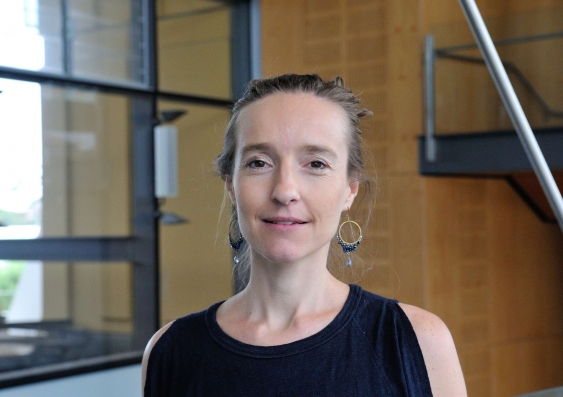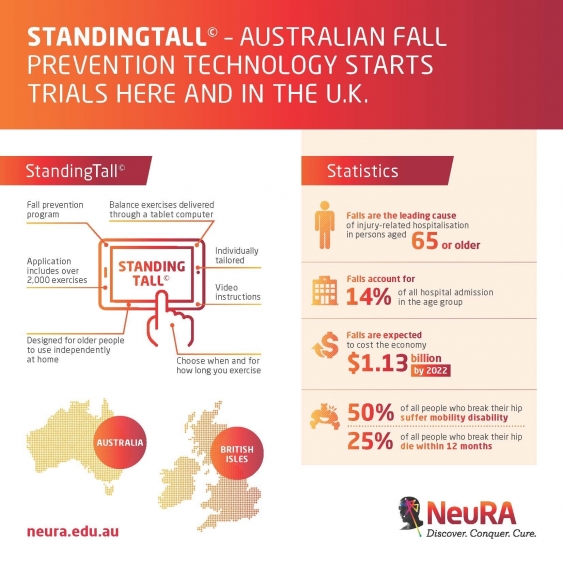Neuroscience Research Australia (NeuRA) and UNSW Sydney's Associate Professor Kim Delbaere has developed a world-first technology-based program called StandingTall to address the needs of correcting falls and balance in seniors.
As a recent recipient of an Australian Government National Health and Medical Research Council grant (NHMRC), the StandingTall program is set to start trials both here in Australia and in the UK.
The program is an individually-tailored, home-based, fall prevention app based around a specific set of balance exercises delivered through a tablet computer. The app can be accessed via the internet, making the cost of delivery highly economical and easily deliverable across multiple cultures and languages worldwide.
The application includes over 2000 exercises with video instructions and is designed for older people to use independently at home. It allows participants to choose when and for how long they exercise throughout the week, with a recommended dose of two hours of exercise each week. The exercises are designed to train both static and dynamic balance skills, while standing on the floor or a foam cushion and while stepping in different directions and on a box.
This research aligns with local, state, national and international goals to reduce falls in older people of NeuRA's eight project partners in both Australian and UK national health settings.
In Australia, the project has three New South Wales (NSW) policy partners who will provide strategic advice to implement the StandingTall program across the state. These policy partners are the NSW Office of Preventive Health, Clinical Excellence Commission and Agency of Clinical Innovation. The program also has a UK partnership with the Northern Health Science Alliance (NHSA).
In addition, a total of three Australian-based clinical partners will support the practical implementation process of StandingTall into practice. These clinical partners are two partnering NSW Local Health Districts (Mid-North Coast, Northern NSW), Uniting Care and Austin Health in Melbourne, Victoria.
“It is exciting to see an Australian invention aimed at reducing falls and improving balance in older people starting an international journey, made possible by an NHMRC grant and support from our partners,” said Associate Professor Delbaere, a conjoint lecturer from UNSW's School of Public Health and Community Medicine.
The high price of falls
- Falls leading cause of injury-related hospitalisation in persons aged 65 or older
- Falls account for 14% of all hospital admission in the age group
- Falls are expected to cost the economy $1.13 billion by 2022
- 50% of all people who break their hip suffer mobility disability
- 25% of all people who break their hip die within 12 months
“The collaboration with the UK-based Northern Health Science Alliance happened quite organically, and it is pleasing to see their recognition of the benefits of this program developed over the last six years at NeuRA.”
“This international alliance understands the immense need to curb the rate of falls in seniors, which often leads to hip fractures and loss of independence resulting in greater costs for carers, communities, their families and loved ones” said Associate Professor Delbaere.
Utilising an easy-to-deliver mobile technology platform, StandingTall has been designed to enable maintenance, updates, tailoring and exercise progressions to be updated online, whilst levels and challenges keep the participant engaged and challenged at their own rate.
Doctor Hakim Yadi, chief executive of the NHSA said, “The NHSA, together with the four North Academic Health Science Networks (AHSNs), is delighted to be a UK partner of StandingTall, an exciting international collaboration in falls prevention. We hope this is the beginning of a much wider collaboration between the North of England and the Australian Health system.”
“There is nothing like this technology lead tool in the world, and some of its most successful features is that the program StandingTall is easy-to-use, offers varied tailored options and progressively difficult exercises, and is compatible with existing fall prevention and self-management programs.”
For those living in rural areas, StandingTall is a game changer as it can be delivered to a simple in-home mobile device which can assist in the prevention of falls and hence prevent the need for emergency medical care from a debilitating fall.
“Our previous research has taught us that, to prevent falls, older people should exercise for two to three hours per week, or as little as 20 minutes a day,” said Associate Professor Delbaere.
“By embracing technology, we are providing an alternative exercise opportunity, which is engaging, fun and motivating, hoping to generate higher levels of adherence over a longer period of time.”
The recent success of the NHMRC grant and the national NSW and VIC partnerships and international partnership with Northern Health Science Alliance will see Associate Professor Kim Delbaere complete the final production elements of this innovative application that brings science and clinical practice together, to benefit the lives of our ageing population to help them age well.
“We believe this innovative program offers huge potential in helping older people across the North which is why we’re delighted to be supporting its roll-out in the region,” added Doctor Yadi.



